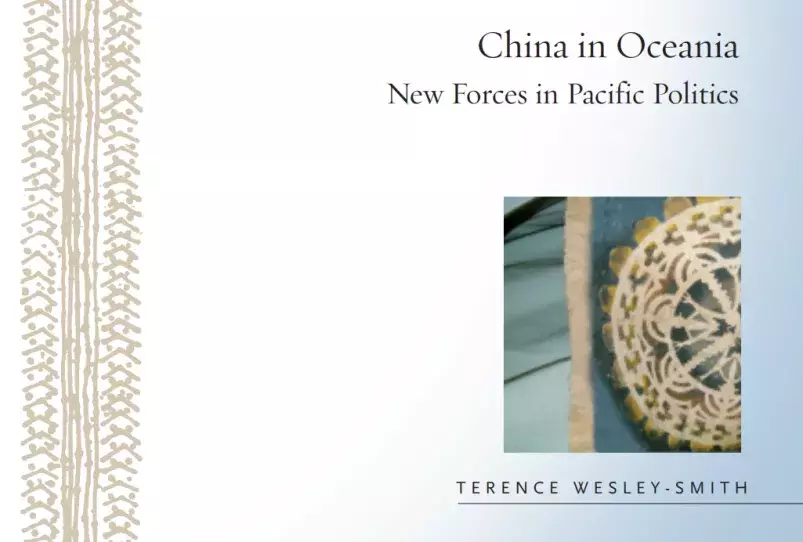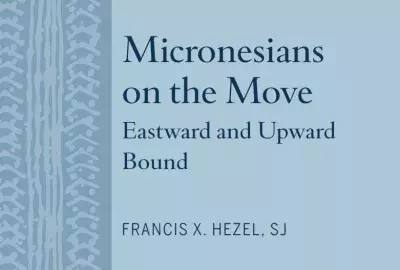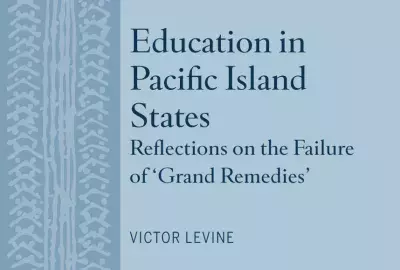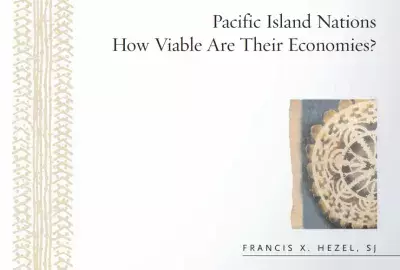Error message

Hard copies available from Amazon.com.
In this policy paper, Terence Wesley-Smith explores strategic, political, and economic dimensions of Beijing's heightened interest in Oceania. He challenges the disingenuous threat discourse pervading the existing literature, and argues that China's rise offers island states opportunities not available under established structures of power.
Wesley-Smith notes that China's primary objective is to gain the support of island states, particularly to isolate Taiwan, and that it has a growing interest in the natural resources of the region. China and the Western powers previously shared an interest in excluding the Soviet Union from Oceania. But today tensions associated with China's presence increasingly influence the strategic environment.
China is not setting itself up to assume a leadership or military role in Oceania, Wesley-Smith maintains. He disputes the notion that Beijing has exploited regional vulnerabilities, and that its activities have encouraged corruption and instability. He also argues that U.S. neglect is not a significant factor in the rise of China in Oceania. Instead, Western aid-leveraged efforts to impose neo-liberal reforms have made island leaders more receptive to peaceful coexistence, equality, respect for sovereignty, and the promise of untied aid.
Wesley-Smith argues that China's rise in Oceania largely parallels developments in the Caribbean, and disturbs a situation where a small number of allied powers exercise enormous regional influence. But he notes that all of these regional actors have growing economic entanglements with China—and compelling reasons to avoid confrontation. He suggests that the Western powers have to accept that China is in Oceania to stay. They can do little but urge Beijing to play by the rules they have established and enforced, yet it may be the allied powers that have to compromise. Wesley-Smith concludes that China's rise broadens the options for island states, whose leaders are accustomed to operating in a world controlled by great powers.
About the Author
Terence Wesley-Smith is associate professor and graduate chair in the Center for Pacific Islands Studies at the University of Hawaii at Manoa. He is a political scientist with degrees from Victoria University of Wellington and the University of Hawaii, and he writes and teaches about contemporary issues in the Pacific Islands region. In March 2007 he co-convened a conference on China's role in Oceania at Ritsumeikan Asia Pacific University in Beppu, Japan. He is presently working on an edited collection of papers from that conference.
Hard copies available from Amazon.com.
In this policy paper, Terence Wesley-Smith explores strategic, political, and economic dimensions of Beijing's heightened interest in Oceania. He challenges the disingenuous threat discourse pervading the existing literature, and argues that China's rise offers island states opportunities not available under established structures of power.
Wesley-Smith notes that China's primary objective is to gain the support of island states, particularly to isolate Taiwan, and that it has a growing interest in the natural resources of the region. China and the Western powers previously shared an interest in excluding the Soviet Union from Oceania. But today tensions associated with China's presence increasingly influence the strategic environment.
China is not setting itself up to assume a leadership or military role in Oceania, Wesley-Smith maintains. He disputes the notion that Beijing has exploited regional vulnerabilities, and that its activities have encouraged corruption and instability. He also argues that U.S. neglect is not a significant factor in the rise of China in Oceania. Instead, Western aid-leveraged efforts to impose neo-liberal reforms have made island leaders more receptive to peaceful coexistence, equality, respect for sovereignty, and the promise of untied aid.
Wesley-Smith argues that China's rise in Oceania largely parallels developments in the Caribbean, and disturbs a situation where a small number of allied powers exercise enormous regional influence. But he notes that all of these regional actors have growing economic entanglements with China—and compelling reasons to avoid confrontation. He suggests that the Western powers have to accept that China is in Oceania to stay. They can do little but urge Beijing to play by the rules they have established and enforced, yet it may be the allied powers that have to compromise. Wesley-Smith concludes that China's rise broadens the options for island states, whose leaders are accustomed to operating in a world controlled by great powers.
About the Author
Terence Wesley-Smith is associate professor and graduate chair in the Center for Pacific Islands Studies at the University of Hawaii at Manoa. He is a political scientist with degrees from Victoria University of Wellington and the University of Hawaii, and he writes and teaches about contemporary issues in the Pacific Islands region. In March 2007 he co-convened a conference on China's role in Oceania at Ritsumeikan Asia Pacific University in Beppu, Japan. He is presently working on an edited collection of papers from that conference.







